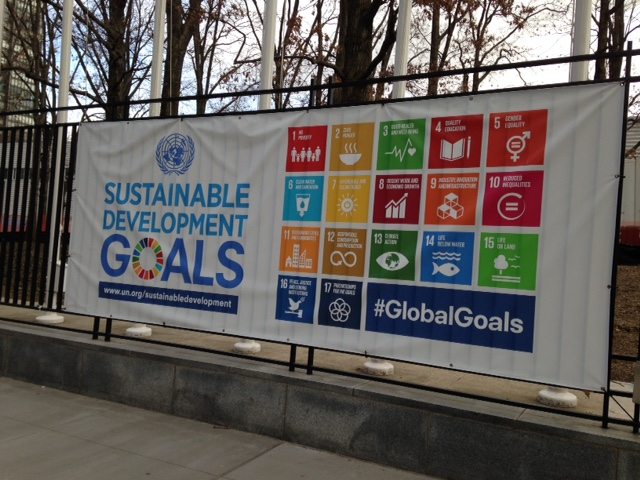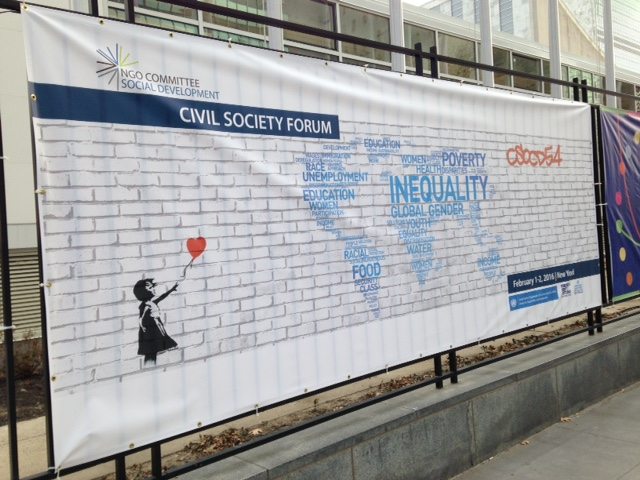NEW YORK—The 54th session of the Commission on Social Development (CSocD) took place from Feb. 3-12 at the United Nations (U.N.) Headquarters in New York. The priority theme for the session—“Rethinking and Strengthening Social Development in the Contemporary World”—aimed to identify new opportunities for sustainable development and provide concrete, forward-looking policy recommendations. It also articulated key inter-linkages between the social, economic, and environmental dimensions of sustainable development.

The 54th session of the Commission on Social Development (CSocD) took place from Feb. 3-12 at the United Nations (U.N.) Headquarters in New York.
CSocD54 assembled a multi-stakeholder panel discussion that explored how existing U.N. institutional frameworks could contribute to strengthening the mainstreaming of disability, enhance awareness, and improve cooperation to advance the implementation of the Sustainable Development Goals (SDGs) in line with the Convention on the Rights of Persons with Disabilities (CRPD).
Agenda 2030 puts poverty and sustainable development at its core and emphasizes a people-centered, unified, and coherent approach. Strengthening social policy and development was emphasized, as it is critical to ensure an integrated follow-up, balancing its social, economic, and environmental dimensions.
As promising as the program and participants sounded, this year civil society organizations felt an unprecedented exclusion to the process. Although they were allowed to make statements during some of the sessions, no civil society representatives were allowed in any of the negotiations of the resolutions—this, after many promises from member states on the board, including representatives from the Romanian and Portuguese Missions.
How will member states implement this agenda without civil society participation? That was a question addressed during the closing session on Fri., Feb. 12. “I must be an optimist that we will deliver on this agenda with the help of civil society. We were honored to host the regional meetings and saw the influence in our community. We hope to see more of that kind of cooperation in the future,” said Elisabeta David, diplomatic counselor of the Romanian Mission, during one of the civil society briefings. Yet, as of the printing of this article, civil society organizations have yet to see the agreed upon resolutions.
Representatives of the Armenian Relief Society, Inc. (ARS) U.N./NGO Committee were present at the Civil Society Forum titled, “Inequalities and the 2030 Agenda for Sustainable Development: Rethinking and Strengthening Social development in the Contemporary World,” held on Feb. 1-2. The committee representatives had concrete recommendations for the commission on understanding the relationship between CSocD and Agenda 2030, and making the link between governments and grassroots.

The priority theme for the session—“Rethinking and Strengthening Social Development in the Contemporary World”—aimed to identify new opportunities for sustainable development and provide concrete, forward-looking policy recommendations.
NEW YORK—The 54th session of the Commission on Social Development (CSocD) took place from Feb. 3-12 at the United Nations (U.N.) Headquarters in New York. The priority theme for the session—“Rethinking and Strengthening Social Development in the Contemporary World”—aimed to identify new opportunities for sustainable development and provide concrete, forward-looking policy recommendations. It also articulated key inter-linkages between the social, economic, and environmental dimensions of sustainable development. The 54th session of the Commission on Social Development (CSocD) took place from Feb. 3-12 at the United Nations (U.N.) Headquarters in New York. CSocD54 assembled a multi-stakeholder panel discussion that explored how existing U.N. institutional frameworks could contribute to strengthening the mainstreaming of disability, enhance awareness, and improve cooperation to advance the implementation of the Sustainable Development Goals (SDGs) in line with the Convention on the Rights of Persons with Disabilities (CRPD). Agenda 2030 puts poverty and sustainable development at its core and emphasizes a people-centered, unified, and coherent approach. Strengthening social policy and development was emphasized, as it is critical to ensure an integrated follow-up, balancing its social, economic, and environmental dimensions. As promising as the program and participants sounded, this year civil society organizations felt an unprecedented exclusion to the [...]
NEW YORK—The 54th session of the Commission on Social Development (CSocD) took place from Feb. 3-12 at the United Nations (U.N.) Headquarters in New York. The priority theme for the session—“Rethinking and Strengthening Social Development in the Contemporary World”—aimed to identify new opportunities for sustainable development and provide concrete, forward-looking policy recommendations. It also articulated key inter-linkages between the social, economic, and environmental dimensions of sustainable development. The 54th session of the Commission on Social Development (CSocD) took place from Feb. 3-12 at the United Nations (U.N.) Headquarters in New York. CSocD54 assembled a multi-stakeholder panel discussion that explored how existing U.N. institutional frameworks could contribute to strengthening the mainstreaming of disability, enhance awareness, and improve cooperation to advance the implementation of the Sustainable Development Goals (SDGs) in line with the Convention on the Rights of Persons with Disabilities (CRPD). Agenda 2030 puts poverty and sustainable development at its core and emphasizes a people-centered, unified, and coherent approach. Strengthening social policy and development was emphasized, as it is critical to ensure an integrated follow-up, balancing its social, economic, and environmental dimensions. As promising as the program and participants sounded, this year civil society organizations felt an unprecedented exclusion to the [...]
[img][/img]
More...